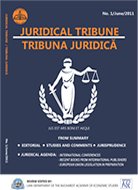Legal classification and judicial syllogism
Legal classification and judicial syllogism
Author(s): Mioara-Ketty GuiuSubject(s): Philosophy of Law
Published by: Societatea de Stiinte Juridice si Administrative
Keywords: actual act; act-species; concept; syllogism; judicial error;
Summary/Abstract: Particularly in criminal matters, the judicial errors register an alarming increase, so much so that it not only affects the destiny of the wrongfully sentenced or the groups that they belong to, but also the destiny of the entire society. A cause of this situation resides, from what it seems, in the lack of thorough legal studies with regards to the logical operations which should stand at the base of the decision that an actual act does constitute a certain offence, with a well specified “classification” or “qualification”. The present paper tries to actuate debates on the matter, which has been wrongfully neglected. With this purpose, the author begins from a rather old idea, but insufficiently known, and that is that any court sentence is the result of two types of judicial syllogisms: qualificative and decisional. Elaborating this idea, the author observes a series of other aspects, such as: the fact that, incriminal matters, the qualificative syllogisms serve to establish the legal classification, while the decisional syllogisms serve to establish the sentence; the fact that, in criminal qualificative syllogisms, the subject is always the actual act, and the predicate is a criminal concept (the notion of an offence); the fact that the legal classification is not an “operation”, as is claimed by many authors, but a conclusion, specifically to a qualificative syllogism etc.
Journal: Tribuna Juridică
- Issue Year: 8/2018
- Issue No: Special
- Page Range: 139-147
- Page Count: 9
- Language: English

